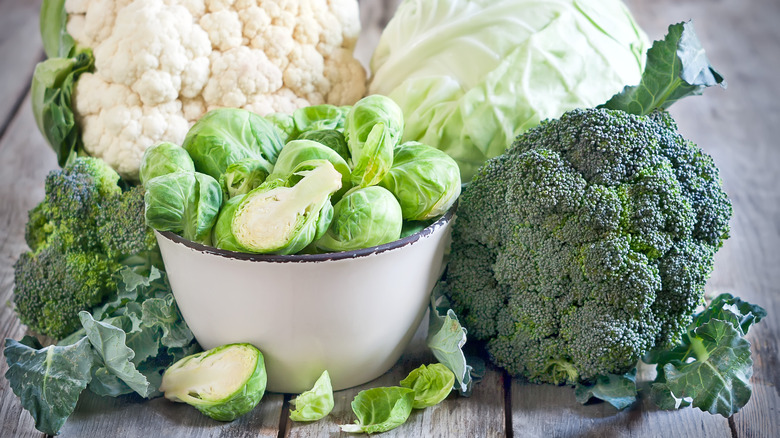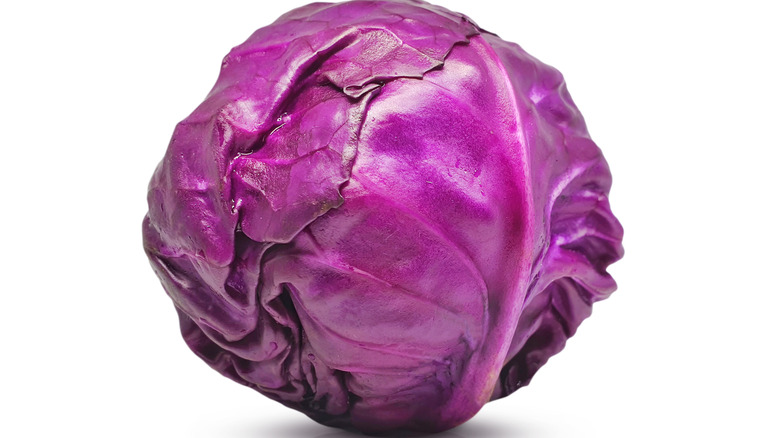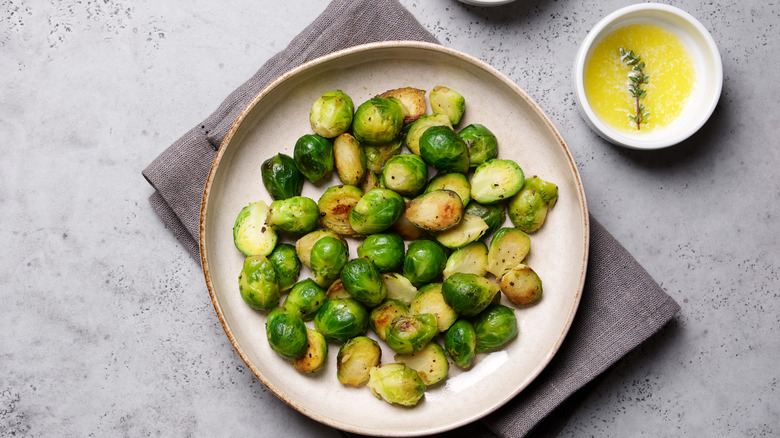Brussels Sprouts Versus Cabbage: Which Is More Nutritious?
Cabbage and Brussels sprouts belong to the cruciferous family of vegetables that also includes kale, broccoli, spinach, and cauliflower. Cruciferous vegetables are so packed with fiber, phytochemicals, and vitamins and minerals important to your health, that they've been called the family of "super veggies" (via WebMD). All cruciferous vegetables contain unique sulfur compounds, called glucosinolates, which give these veggies their pungent aroma and somewhat bitter taste as well as promote good health (via Linus Pauling Institute). According to the National Cancer Institute, cruciferous vegetables have anti-inflammatory powers, contain both antiviral and antibacterial properties, and have been found to protect cells from DNA damage.
Two of the most closely related of the super veggies are the regular cabbage and its miniature version, Brussels sprouts — both cultivated from the same wild cabbage ancestor (via New World Encyclopedia). Despite their close relationship, they not only taste different but they contain distinct compounds that set them apart from each other nutritionally. So which one gives a greater nutritional punch?
Cabbage is a head above the competition
Cabbage is one of the earliest known cultivated plants by humans. It was consumed as far back as 4000 BC in northern China, and later became a staple of ancient Egypt and Rome (via Vegetable Facts). The modern hard-headed cabbage was developed later in northern Europe as a cultivar that can survive harsh winters, then imported to America, and now is produced around the world. Between the green and red variety of modern cabbages, there are some significant nutritional differences.
While both green and red cabbages contain high levels of fiber and many of the compounds that fight against cancer and heart disease found in all cruciferous vegetables, red cabbage has an additional benefit. The pigment that gives red cabbage its distinctive color is the potent antioxidant anthocyanin (via WebMD), also found in blueberries and pomegranates. It turns out, scientific studies show, this antioxidant can fight bacterial infections and prevent eye and brain disorders. This means that if you are looking for the ultimate cruciferous vegetable nutritional powerhouse, red cabbage is hard to beat.
Brussels sprouts are compact nutrition
Named after the Belgian city where they are rumored to have originated sometime in the 13th century (via The Kitchen Project), Brussels sprouts resemble tiny heads of cabbage but are denser. Don't let their small size fool you, however; compact Brussels sprouts pack a nutritional punch. Compared with cabbage, they contain 160% more protein, 200% more fat, and 52% more fiber per the same serving size, plus 10 times the amount of beta-carotene and twice the amount of Vitamin C (via Calories Info).
Brussels sprouts are also one of the highest vegetable sources of Omega 3 fatty acids in the world (via My Food Data), giving them a solid advantage over cabbage and any other cruciferous vegetable in this important category. Omega 3 fatty acids are a special type of "good fat" that lower cholesterol levels, reduce inflammation in the body, are associated with good brain health, and lower the risk of heart disease (via The Mayo Clinic). So there you have it: While red cabbage has some amazing and unique health properties, the compact nutrition of Brussels sprouts with their high protein levels and abundance of Omega 3 fats makes them a more complete all around superfood.



